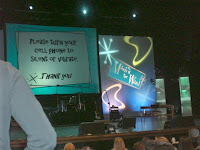Stille Nacht! Heilige Nacht!
I am sure that you guessed the title of this post is in German. That is because this song was originally written in German. It is none other than Silent Night. This song has been recorded more than any other song in history. It also is the song at the forefront of one of my favorite historical events of all time.
In 1818, Joseph Mohr was placed in charge of the music for Christmas Eve Mass at his church, St. Nicholas Church in Oberndorf, Austria. He had spent months planning every detail. As he made last-minute preparations, he discovered a horrible problem. The organ wouldn't play. He climbed underneath fiddling with the keys, stops, pedals, and anything he could possibly think of to fix it. He realized there was no fixing it. What was he going to do? Christmas Eve midnight mass was only hours away! He stopped and prayed for God to help him come up with a plan. That was when he remembered he had written a 6 stanza Christmas poem inspired by a walk from his grandfather's home to their church, two years earlier.
He ran home and dug the poem from the bottom of his desk drawer. He then fought his way through snow-covered streets to his friend, Franz Gruber. He was the school teacher and lived in a drafty apartment above the schoolhouse and he was the organist. Joseph explained that the organ was broken and not playing and they were in a dire situation for Midnight Mass was soon. "Franz!", Joseph begged, "Can you write music to this poem that can be easily learned by the choir for tonight's service?" With a twinkle in his eye, Franz nodded his head and said he was up for the challenge. Joseph left him alone with his thoughts so he could write the music. A few hours later the two friends met at the church in the candlelit sanctuary. Joseph was very pleased with what Franz had come up with. They rushed the music to the choir who were waiting for their scheduled rehearsal. Joseph and Franz taught the choir the four-part harmonies to the last 2 lines of each verse.
Shortly after midnight, Joseph and Franz stood in front of the main altar and introduced their song. As they sang with the choir, they could've never imagined this song would not only be remembered by their little village but around the world 200 years later.
Fast forward only 100 years, Christmas Eve, 1914. Soldiers were miserable in the cold, dark, wet, and muddy trenches on the Western Front in, Belgium during the first World War. A British machine gunner suddenly started hushing everyone. "Quiet! Listen! Do you hear that?" As they listened they heard a tune that was very familiar to them, but it was in German instead of English. The Germans were singing Silent Night! The British joined in the singing and both sides were singing Silent Night together. Once the song was over they heard shouting from the German side. In a thick German accent, they heard, "You come over here". One of the British sergeants answered, "You come half way, I come half way."
What happened next is unbelievable! It would shock the world and make a mark in history. The soldiers nervously started climbing out of their trenches to walk towards each other, meeting halfway in No
Man's Land. They shared handshakes, kind words, tobacco, wine, and songs and celebrated Christmas together through the night and into the following day. They were laughing and chatting. They took pictures, exchanged gifts, and even played football. They also helped each other bury casualties and repair the trenches. Only hours before they were trying to kill each other. In reality, there wasn't an ounce of hate from either side.
A piece of historical significance that can't go
unmentioned is that after that day, in that spot on the Western Front, the fighting didn't return to what it was before. Because of that, both British and German officers had to relocate the soldiers involved in the Christmas truce. They no longer wanted to fight their "friends".
This video is my favorite video about the Christmas truce. It is actually an ad for Chocolate, but it is the best video portraying what happened on that day.
* "Stories behind the Best-Loved Songs of Christmas" by Ace Collins.
* History.com and WWI Christmas Truce of 1914








Comments
Post a Comment